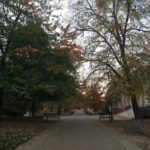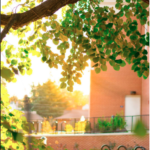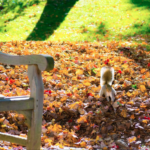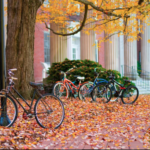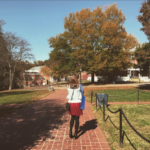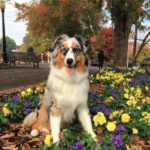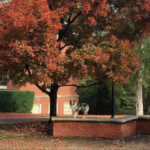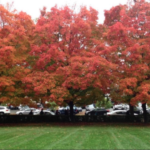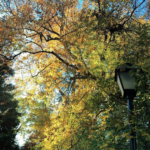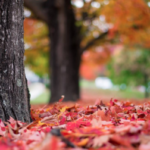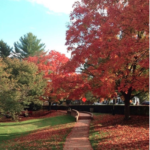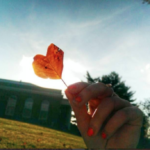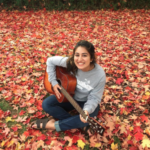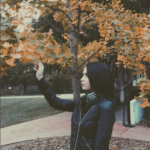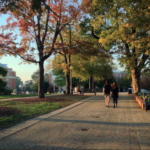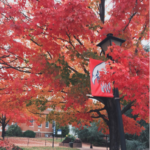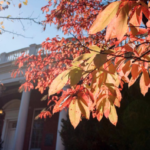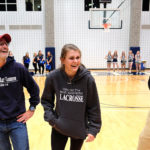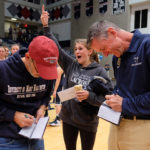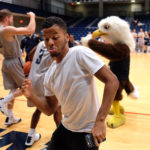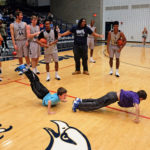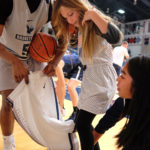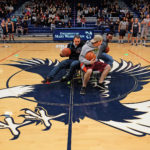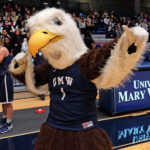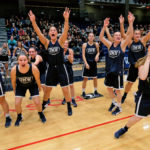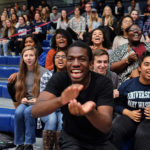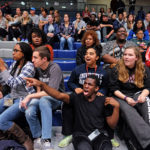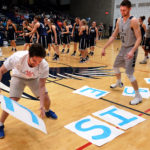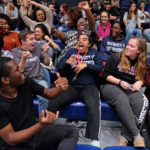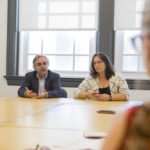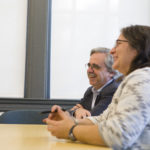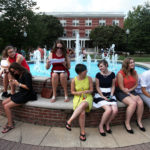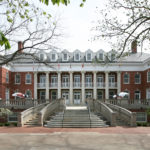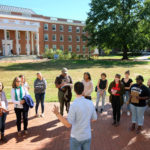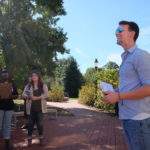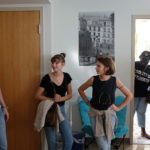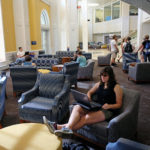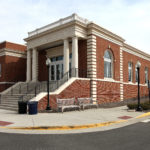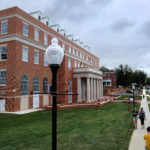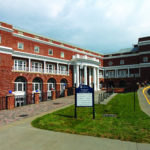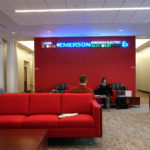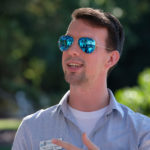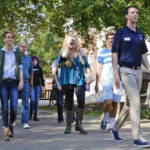Request your invitation to the April 21st inauguration celebration
Find your Purpose
Apply regular decision for first-year admission by Feb. 1
Falling for UMW
As the minutes ticked down to 5 p.m., first-year student Jarred Cannon kept refreshing UMW’s Instagram feed. One of six finalists in the university’s #Fall4UMW photo contest, Cannon hoped to rake in enough likes for his image to win.
Moments later, his photo of the Center for International Education’s study abroad sign amid the bright orange leaves secured a slight edge over the competition, beating out more than 50 other entries.
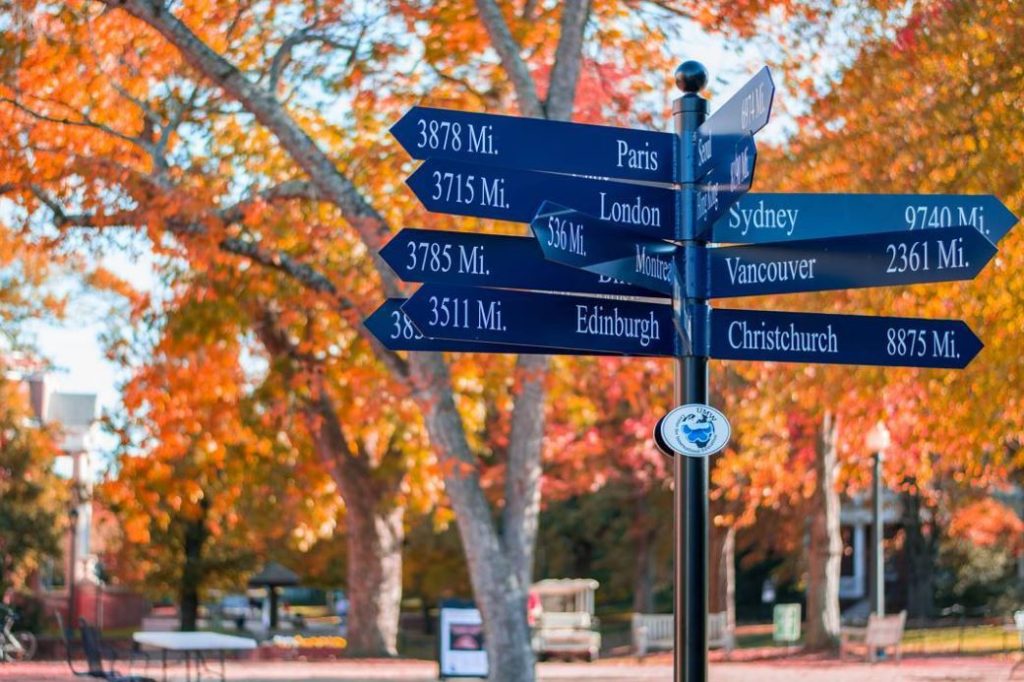
“I captioned it, “oh the places you’ll go” not just as a Dr. Seuss reference but as a challenge,” said Cannon, a computer science and communications major. “The picture is meant to ask you where you’ll end up and how you’ll get there. More than that, it’s supposed to beg the question, ‘How far will you go?’”
The two-week Instagram contest encouraged students and the broader UMW community to share fall photos of campus with the hashtag #Fall4UMW. Six finalists were published on UMW’s Instagram on Tuesday, Nov. 15, and the winner was selected by popular vote determined by the most likes received. As the winner, Cannon will receive a $50 UMW Bookstore gift card.
Follow UMW on Instagram at https://www.instagram.com/uofmarywashington/.
Select #Fall4UMW Instagram Contest Entries:
To see more entries, visit https://www.instagram.com/explore/tags/fall4umw/.
Vying for Victory
UMW volleyball advances to NCAA Elite Eight
Eagle Madness
Silence swept over UMW’s Ron Rosner Arena. More than 500 Students and community members rose to their feet. With prize money on the line, first-year student Paige Haskins stood center court, poised for the adrenaline-pumping finale of last night’s first-ever Eagle Madness event.
She drew a deep breath, took a running start and sent the ball soaring into the air. When it swooshed through the net, students rushed to the floor. The crowd went wild, chanting “Write the check,” “Write the check” to UMW President Troy Paino and Athletic Director Ken Tyler, who’d agreed to split payment of the $500 award.
The heart-stopping half-court competition was the culmination of a series of activities that marked the début of Eagle Madness, a spirit-boosting midnight madness-style event hosted by UMW Athletics. The two-hour inaugural event celebrated the start of UMW’s basketball season, set to open this year with a men’s game on Tuesday, Nov. 15 at 7 p.m. in the Anderson Center.
Featuring raffles and games like musical chairs, an Eagle relay race and a poster slogan scramble, the evening also included performances by UMW’s dance and step teams. Senior Mikey Barnes led the event as emcee, introducing the players and coaches for the men’s and women’s basketball teams, and pumping Eagle pride through the crowd.
Both teams have big goals for their seasons, which include a total of 26 home games to be played in the Anderson Center’s Ron Rosner Arena.
“I think it’s important to never be complacent,” said sophomore and men’s basketball player Johnny Cronin, who was part of the team’s 15-12 record last season that led them to the CAC semifinals. “You have to push yourself.”
Men’s Head Coach Marcus Kahn echoed the sentiment, that his goal for the team is simple: to keep getting better each day.
With Head Coach Deena Applebury at the helm, the women’s basketball team, which will enter the season ranked 22nd in the nation, has lofty ambitions, as well. The team returns with a 24-5 season in which they claimed the CAC Championship.
Senior Megan Green looks to her teammates to build that success.
“These girls have changed my life,” Green said. “They are the greatest group of women I have ever met. They are the reason I’m here and loving life.”
For more information about the UMW Athletic teams, visit http://www.umweagles.com. To learn more about season tickets to UMW’s men’s and women’s basketball games, visit http://umweagles.com/general/2016-17/releases/20160826gz0xnn.
Eagle Madness
UMW ushers in new basketball season
Eagle Madness
UMW ushers in new basketball season
Election-Ready
With ballot and pencil in hand, you walk over to a covered voting booth. Looking down, you see a line of empty white bubbles next to names you’ve heard on the news for more than a year. But do you really know what the names stand for? Are you ready to vote?
On Tuesday, Nov. 8, more than 4,300 University of Mary Washington students will be eligible to vote for the first time. In preparation, UMW political experts Stephen Farnsworth, professor of political science, and Rosalyn Cooperman, associate professor of political science, weighed in on the 2016 U.S. Presidential election to answer questions from our own UMW community.
If I vote third party am I voting for Donald Trump or Hillary Clinton?
Cooperman: If depends on which state you’re voting in. If you’re voting in the Commonwealth of Virginia, I don’t know that a third party vote would affect the outcome given the polls that I’ve seen. In terms of Clinton having a comfortable enough lead in registered voters in the Commonwealth, it would be a vote for Trump. But would it affect the outcome of this state contest? Probably not.
Farnsworth: The main thing is that people have very different political environments and very different states. When you look at Virginia, the polls show an advantage for Hillary Clinton. So the consequences, in my view, are that the gap does seem large enough that more or less people can do as they please without affecting the outcome very much. If we were having this conversation about voters in Florida or North Carolina or Iowa, then we’d be looking at a state that’s a lot closer than Virginia looks to be right now, and that would suggest the wisdom of being very careful about the outcome. What often happens when you vote third party in a close election is the candidate you personally least like ends up benefiting.
Does it seem likely that Virginia will vote Democratic for three presidential elections in a row?
Farnsworth: Having Tim Kaine on the ticket as a vice presidential nominee is going to add a few points to the Democratic total in Virginia. If Kaine were not on the ticket, Hillary Clinton might be in more of a competitive race in this state. That being said, assuming that Tim Kaine is on the ticket four years from now, there would still be a couple-point bump for the Democrats in that situation. But it’s important to remember that Virginia’s purple-state status hasn’t gone away even with Tim Kaine on the ticket. The average right now for Virginia is about a four-point advantage for Hillary Clinton so it’s still more or less purple, it’s just not as purple as say Florida or North Carolina or Ohio might be right now.
Donald Trump has implied that he may not accept the results of the election. Is a candidate’s concession statement a legal requirement or just a political tradition?
Cooperman: Is a candidate’s concession speech a formal requirement? No. But I think what candidates understand, at least candidates prior to this election cycle have understood, is that there is something to be celebrated if not encouraged by the democratic transition. Winners and losers alike accept the outcome and the system resets for the next election. There is an expectation of being able to potentially look at how the vote count preceded, but that’s a very different tone from the outright and disturbing notion of refusing to accept the election outcome unless one wins.
Farnsworth: Donald Trump talking about the illegitimacy of this process before it even takes place has increased the likelihood that people will be very upset on Election Day. It may not be very pleasant for those people waiting to vote or having to face questions about whether they’re legitimate voters. I think that what Donald Trump has done is deeply troubling and really undermines the way Democrats and Republicans have been competing in elections for decades.
How can Republicans go about healing the rift within their party?
Cooperman: I recently interviewed Jennifer Pierotti Lim, a 2007 alumna of UMW, who founded Republican Women for Hillary. She spoke very candidly about the Growth and Opportunity Report that came from the Republican Party in early 2013 following their loss of the 2012 election. She was delighted that the Party recognized the need for outreach with communities of color and younger voters, and the need to be intentional in highlighting the role of women partisans in the Party. Then this campaign comes along, and she feels like her idea of what it means to be a Republican isn’t valued in the Party anymore. In fact, many of the people who find themselves in a group like Republican Women for Hillary have come out and said, “I’m a Republican, but this is a bridge too far for me in terms of supporting Donald Trump.” There is and should be a concern about how easily and whether or not those folks will come back into the party fold. The Republican Party is not a viable party without women.
Farnsworth: I think the key question is how much of a margin there is on Election Day. The scenario for the Republican Party is going to be a very painful one if it’s close. If the Republican Party doesn’t lose by much, the party’s identity crisis continues for another four years because they’ll continue down the same track. If the Republican Party gets blown out, they might make a more definitive turn.
Enthusiasm about the election peaked in March, when Sanders was drawing wide millennial support in his bid for the Democratic nomination. It dropped some in August and again a little last month. Why should millennials be sure to vote next week?
Farnsworth: I think that you have to appreciate the fact that these one-day presidential elections have extraordinarily long-term consequences. Whether you like or don’t like one or both of these candidates, you will be governed by one of them and the decision made by this country on Election Day will affect things like the Supreme Court, our international relations and war and peace. Who knows how much the impact of a presidential election can be? It’s important to remember that the consequences downstream in terms of whatever might come across four years of a presidency can really have dramatic impacts. So even if you think that Election Day doesn’t matter, for four years you’ll learn that it does.
Cooperman: This enthusiasm gap will have an impact on the candidates who run. Political science research tells us that younger people are not reliable voters and most are very turned off by the prospect of running for office. That’s a problem for this election and ones in the future. Democracies work best when people opt in – to vote and be invested enough in the system to want to participate in a meaningful way. If millennials sit out this election, they’ve given away their voice and an opportunity to have their say about how we order our priorities and spend finite resources.
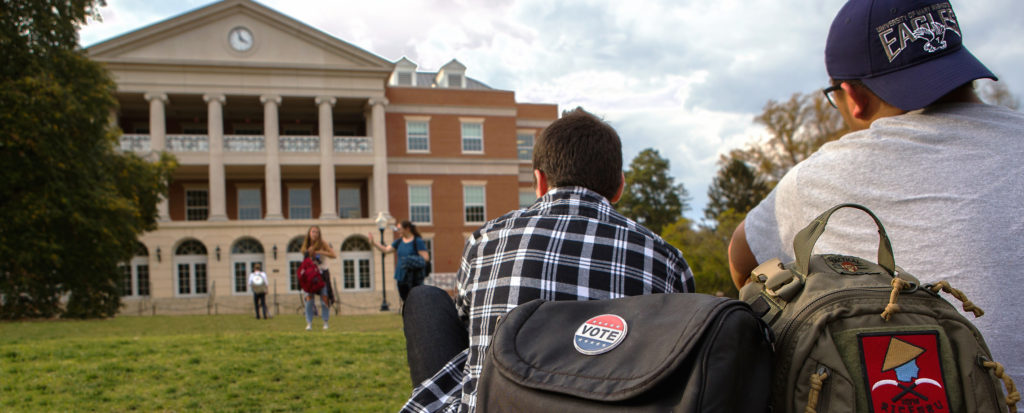
Rosalyn Cooperman, associate professor of political science, specializes in American political parties and the U.S. Congress. Her articles have been featured in multiple publications such as, American Political Science Review (2010), Virginia Social Science Journal (2011), and Political Science Quarterly (2015). She is a regular contributor to Presidential Gender Watch. Before coming to the University of Mary Washington in 2003, Cooperman’s professional experience in the political arena included serving as a campaign manager for Congresswoman Jill Long (IN-4) and working in the Montana State Legislature. Currently, she teaches the FSEM “U.S. Campaigns and Elections,” in which her students deconstruct the 2012 presidential campaign to analyze the current 2016 campaign.
Stephen Farnsworth is professor of political science and director of the Center for Leadership and Media Studies at the University of Mary Washington. He is the author and co-author of five books and dozens of scholarly articles on the presidency, mass media and Virginia politics. His political commentary has appeared in many media outlets such as The New York Times, Washington Post and C-SPAN. Farnsworth is a former Canada-U.S. Fulbright Research Chair in Public Policy at McGill University in Montreal and a former chair of the political communication section of the American Political Science Association.
UMW Nursing Gets a Boost
UMW nursing receives a $1.4 million grant and accreditation
Eagle Eye View
Welcome to your UMW campus tour with senior guide Marc Gehlsen.
11:30 a.m., Lee Hall: Home of Admissions, Student Services, Financial Aid and More
You push open the door to Lee Hall, step out onto the sun-soaked stone terrace. Blinded, you squeeze your eyes shut, replay the admissions message inside your head. You refocus, look out onto the Fredericksburg campus. In a flash, you see your future unfold.
11:32 a.m., Ball Circle: The center of Mary Wash student life and traditions
You hurry down the steps to join your tour group. That’s when Marc Gehlsen whisks onto the scene.
He struts like a drum major across a faux stage. Anything to get your attention. “A big word on campus is ‘tradition,’ ” he says, pointing to the spherical lawn, site of uniquely Mary Washington customs like Club Carnival and Devil-Goat Day. He reveals he’s a devil, spars with a mom in the crowd who says she’s a goat.
A Washington Guide, Gehlsen has led UMW tours for years, zany one-liners, colorful commentary and all. He delivers in English, of course, but he also speaks Spanish, French, Chinese, Russian and Arabic. His love of language will take him into the courtroom as a forensic linguist, but for now he’s using his words to wow campus visitors – like you.
11:37 a.m., Randolph-Mason Hall: One of Mary Washington’s 18 residence halls
You stroll along Campus Walk toward Randolph-Mason Hall, dodging a squirrel on the way. Inside, Gehlsen starts in – student IDs, laundry, bathrooms. Private or shared, he jokes, they both accommodate the urge to “sing Disney ballads in the shower.”
He had his share of sharing growing up, the youngest of five on a Nokesville, Virginia, Christmas-tree farm. He gleaned what he could from his siblings, who all studied language before him, and from the migrant workers his father, a masonry carpenter, invited to dinner.
By the time Gehlsen took Spanish in middle school, he could curl and roll r’s like nobody’s business, and he zoomed to the top of his class. Other languages followed, including Hawaiian, because “who doesn’t want to say ‘aloha’ whenever they get the chance?”
In college, Gehlsen knew he would major in Spanish. A campus tour led him to choose Mary Washington. It was fall, and the scenery and sense of community – everyone seemed to smile and say “hi” – cast a spell, he said, like a wand that finds the right wizard. Hands all aflutter, he demonstrates the Harry Potter effect for your tour.
11:45 a.m., Palmieri Plaza: A signature UMW meeting area, complete with fountain
You move on with the group, trailing Gehlsen up the hill to Palmieri Plaza. “You have to swim in the fountain at least once before you graduate,” he says. “If you’d like to try it before the end of the tour, you’re welcome to.”
11:47 a.m., Monroe Hall: One of UMW’s many academic buildings, housing history, geography and political science
Lost in the bubbly blue water, you realize the crew has moved on without you. You catch up, climb the steps to Monroe Hall. File into a classroom. Slide into a desk. Gehlsen’s up front, explaining UMW’s Honor Code, Office of Disability Resources and opportunity to create unique courses of study. He dishes on his own second major, a linguistics program he crafted himself.
“His brain has a knack for language,” said Betsy Lewis, professor of Spanish and chair of the Department of Modern Languages and Literatures. “Some students worry they’ll make a mistake. They freeze up. Marc’s personality is so outgoing he can just jump right in and not worry about any of that.”
A Phi Sigma Iota language honor society member, he studied abroad on a trip Lewis led to trace Don Quixote’s footsteps through Spain and plans to pursue a master’s degree in linguistics on the West Coast. At UMW, Gehlsen has handled social media for the Honor Council, coordinated programming for Green Housing, and started an honors thesis that keeps him holed up in the Hurley Convergence Center. Your group heads there next.
11:56 a.m., Hurley Convergence Center: Four stories of state-of-the-art tech capabilities
You walk on, passing Simpson Library and Blackstone Coffee, which a fully caffeinated Gehlsen calls “the most important building on campus.” You visit the Goolrick Hall gym, see the Anderson and University centers, before returning to Lee, where you browse through the bookstore for the perfect memento.
But you know you’ll be back.
It’s a quick glimpse of campus, but for Gehlsen – who caught the tour-guide bug as a freshman, brewing coffee and propping open the door of his Randolph Hall room, which was part of the rounds – it speaks volumes.
“I’ve loved every single second of it,” he said. “I get to spread the word of the UMW awesomeness.”
Intrigued by Gehlsen’s tour of the UMW campus? Want to see more? Take our guided, interactive virtual tour!
